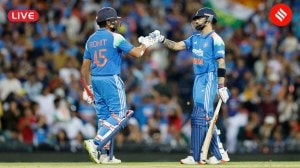Stay updated with the latest - Click here to follow us on Instagram
Show me the money
It is not breaking news: Gujarati theatre in Mumbai has been thriving,commercially,for years now. And the not-so-secret formula behind its success is the unique concept of social groups
Gujarati Theatre has never been bogged down by commercial concerns,but at what cost,wonders Alaka Sahani
It is not breaking news: Gujarati theatre in Mumbai has been thriving,commercially,for years now. And the not-so-secret formula behind its success is the unique concept of social groups. These groups promise at least one foreign trip,a stipulated number of dinner parties,picnics,ras garba events and theatre shows every year for an annual membership. Such a package deal works out well for Gujaratis famous for their proclivity for entertainment and social dos as well as theatre groups,who often get a packed auditorium.
However,what appears to be the source of much consternation in this merry arrangement is the space,rather the lack of it,for anything thats experimental. Despite the tradition of Bhangwadi and Bhavai folk theatre forms of Gujarat theatre from the region has flourished by adapting or translating successful Marathi plays. They even stage adaptations of Hindi and Hollywood films, says Jyoti Vyas,a theatre personality and critic. This has not stopped experimental plays from making their appearances once in a while,though their presence continues to be marginal compared to Marathi,Hindi and English plays. But when they do,they find renting popular venues for Gujarati plays such as Bhaidas Hall in Vile Parle,Zaverben Popatlal Sabhagriha in Ghatkopar,and Thackeray Theatre in Borivali,beyond their budget.
Thats why the space for them has remained restricted to Prithvi Theatre and the National Centre for Performing Arts (NCPA) the main hubs of experimental work. Mysore Association in Matunga and Bharatiya Vidya Bhavan in Chowpatty are other places that often open their doors to experimental works. As footfall at these places remains low,they fail to reach a wider audience, says Kamlesh Mota,Deputy Director of Programme,Bharatiya Vidya Bhavan.
Given these concerns,NCPAs first ever Gujarati Natya Utsav Vasant,a three-day festival that takes off today comes as a boost to the art form. The festival presents nice non-commercial Gujarati plays from Mumbai and Gujarat, says Deepa Gahlot,head of programming (theatre and film),NCPA. The festival will stage five plays,apart from poetry readings and discussions. Next year,she hopes to hold a bigger festival where the spotlight will be on new writing.
The reason for not supporting experimental work,particularly when they go overboard with commercial shows,is something to do with the Gujaratis inherent nature. They seek fun and frolic often with all the family members in tow. And thats something the social groups guarantee. There are nearly 200 of them in Mumbai,including Mahila Mandals,Jain Jagruti Centres and Jain Social Groups. There are at least 10 shows happening in and around Mumbai every week. The main attractions are lucky draws,buffet dinners and other fun elements while a comedy or social drama two most popular genres unfold on the stage. The plays even include SMS jokes and hit songs, says Manoj Shah,director of Apurva Avasar. The primary aim is not to watch a play,but to enjoy a get-together. Thats the reason,Bhaidas Hall is packed during the daily afternoon shows of womens groups as well as the evening shows for families or couples,says its manager Vinay Parab. Apart from accommodating 1,100 viewers in its auditorium,the theatre also has space to host dinners. These shows,mostly held on weekdays,are not ticketed and are known as sold-out shows.
As expected,the quality,music or set designing of a play often takes a backseat, says Manhar Gadhia,who recently produced Saat Tari Ekvees,that strung together one-act plays by seven playwrights. Moreover,despite having a large number of viewers,Gujarati theatre is hardly creating a new audience. The average age of viewers remains 40-plus. This means,the Gujarati youngsters are not involved in theatre,
says Gadhia. Irrespective of the odds,there are artistes such as Shah,who have tried to circumvent the system. Since religious and famous Gujarati personalities are of interest to many,the founder of Ideas Unlimited group has made plays such as Apurva Avasar,which looks at the life and work of seer Shrimad Rajchandra,and Mareez,which traces the journey of a shayar. My main aim is to create an audience, says Shah,who has managed to straddle both worlds that of sold-out and ticketed show. Like him,Manish Parekh,a writer-director based in Rajkot,is bringing Vishwamanvi: Umashankar Joshi to the festival.
What has kept the hope high for good Gujarati theatre,is the presence of good writers like Saumya Joshi,Mihir Bhuta and Bhavesh Mandalia. After all,there has never been a dearth of talent here. Some of the popular actors,directors of India such as Paresh Rawal,Shafi Inamdar,Tiku Talsania,Vipul Shah and JD Majethia have their roots in Gujarati theatre.







